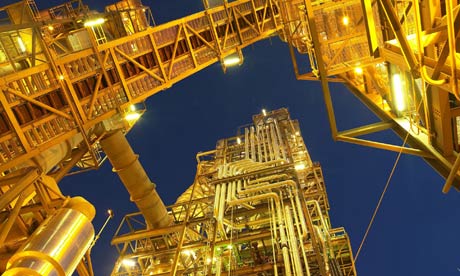Rio Tinto lays off 16,000 as profits slump by more than half
Rio Tinto suffering from collapse in value of minerals it produces

A Rio Tinto plant in Australia. The mining group has cut 16,000 workers amid a profits slump. Photograph: Reuters
Rio Tinto has slashed spending and laid off 16,000 of its workforce after seeing profits slump by more than half following a collapse in the value of the minerals it produces.
The mining group said it had cut 2,000 more jobs than originally planned, a quarter of its 60,000 workforce, as it closed loss-making aluminium smelters and axed the development of new mines. Tom Albanese, its chief executive, said that further mass layoffs were not being planned.
Jan du Plessis, parachuted in as chairman to deal with the fiasco over the $20bn Chinalco fundraising, publicly backed Albanese, the principal architect of the aborted deal. Du Plessis said there were no plans to replace any executive directors, but indicated he would bring in some new blood to the non-executive board.
The miner said it had cut production of its highest cost aluminium smelters and would look at making further capacity cuts after the troublesome division made a loss of $689m (£417m). By the end of the year, it said that over a tenth of its smelting capacity would be mothballed or sold off.
Last week, Rio confirmed that it was shutting its Anglesey aluminium smelter next month, with the loss of about 400 jobs, because it would be too expensive to renew its electricity contract. A spokesman said that there were no plans to close Rio's two other smelters in Britain – in Northumberland and Scotland.
Albanese attempted to sound upbeat about the second half of the year, despite reporting earnings of $2.6bn for the first six months of the year, compared with $5.5bn last year.
Rio said it was planning to increase spending for the year to develop new mines, particularly iron ore, to $5bn from its previous forecast of $4bn, as commodity prices started to recover.
The results mark what Albanese hopes will be the end of a torrid period. Rio bowed to shareholder pressure and scrapped the controversial Chinalco deal, opting instead for the rights issue it had originally decided against.
Rio Tinto suffering from collapse in value of minerals it produces

A Rio Tinto plant in Australia. The mining group has cut 16,000 workers amid a profits slump. Photograph: Reuters
Rio Tinto has slashed spending and laid off 16,000 of its workforce after seeing profits slump by more than half following a collapse in the value of the minerals it produces.
The mining group said it had cut 2,000 more jobs than originally planned, a quarter of its 60,000 workforce, as it closed loss-making aluminium smelters and axed the development of new mines. Tom Albanese, its chief executive, said that further mass layoffs were not being planned.
Jan du Plessis, parachuted in as chairman to deal with the fiasco over the $20bn Chinalco fundraising, publicly backed Albanese, the principal architect of the aborted deal. Du Plessis said there were no plans to replace any executive directors, but indicated he would bring in some new blood to the non-executive board.
The miner said it had cut production of its highest cost aluminium smelters and would look at making further capacity cuts after the troublesome division made a loss of $689m (£417m). By the end of the year, it said that over a tenth of its smelting capacity would be mothballed or sold off.
Last week, Rio confirmed that it was shutting its Anglesey aluminium smelter next month, with the loss of about 400 jobs, because it would be too expensive to renew its electricity contract. A spokesman said that there were no plans to close Rio's two other smelters in Britain – in Northumberland and Scotland.
Albanese attempted to sound upbeat about the second half of the year, despite reporting earnings of $2.6bn for the first six months of the year, compared with $5.5bn last year.
Rio said it was planning to increase spending for the year to develop new mines, particularly iron ore, to $5bn from its previous forecast of $4bn, as commodity prices started to recover.
The results mark what Albanese hopes will be the end of a torrid period. Rio bowed to shareholder pressure and scrapped the controversial Chinalco deal, opting instead for the rights issue it had originally decided against.
